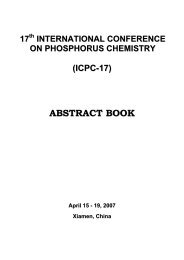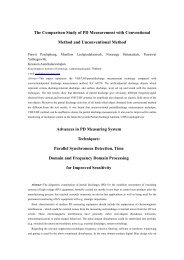Climate Change and Dryland Agricultural Ecosystem Management
Climate Change and Dryland Agricultural Ecosystem Management
Climate Change and Dryland Agricultural Ecosystem Management
Create successful ePaper yourself
Turn your PDF publications into a flip-book with our unique Google optimized e-Paper software.
The Institute of Arid Agroecology<br />
The Institute of Arid Agroecology of Lanzhou University is affiliated to the MOE (Ministry of<br />
Education) Key Laboratory of Arid <strong>and</strong> Grassl<strong>and</strong> Ecology. It bears a glorious history <strong>and</strong> fine<br />
academic tradition. Since its establishment in the 1990s, the institute has undertaken the mission of the<br />
revitalization of agricultural <strong>and</strong> ecological sustainable development in northwest China. Its objective<br />
is to develop water-saving ecological agriculture in arid <strong>and</strong> semiarid areas, <strong>and</strong> harmonize the<br />
relationship between human <strong>and</strong> nature in ecologically fragile areas. Nowadays, the drought has<br />
severely restricted the northwest environmental <strong>and</strong> social development, <strong>and</strong> the ecological crisis<br />
compels us to seek to resolve these issues. It is incumbent for the institute to take up the responsibility<br />
of scientific research in arid environments.<br />
The institute centers on the arid <strong>and</strong> semi-arid regions, which occupies 52.5% of the total area.<br />
Because of the drought <strong>and</strong> coldness, especially the serious degradation of ecosystems resulting from<br />
the fragility of the ecological environment, high intensity of population <strong>and</strong> agricultural pressures, the<br />
sustainable development <strong>and</strong> the protection of ecological environment have become major issues<br />
worldwide. To solve the above problem lies in how to correctly underst<strong>and</strong> <strong>and</strong> appropriately control<br />
the evolution of natural ecosystems to increase vegetation coverage <strong>and</strong> improve the ecological<br />
environment; how to improve <strong>and</strong> monitor agro-ecosystem productivity in order to enhance the overall<br />
development level, which precisely constitute the core <strong>and</strong> the goal of our team’s research.<br />
Faced with these problems, based on farml<strong>and</strong>-l<strong>and</strong> productivity, studies on agriculture <strong>and</strong><br />
animal husb<strong>and</strong>ry are combined to improve agricultural productivity <strong>and</strong> increase integrated<br />
ecosystem vegetation coverage. The team st<strong>and</strong>s out by the combination of ecology <strong>and</strong><br />
agriculture-forestry. In the mid-80s mid-90s of the 20th century, to deal with the long-term<br />
degradation of ecosystems <strong>and</strong> low life quality in the semi-arid Loess Plateau region, the team, led by<br />
Professor Song-Ling Zhao, proposed rain-harvesting agriculture system, which would serve as the<br />
foundation of further dryl<strong>and</strong> agro-ecological research.<br />
The founder of the research team for the original State Key Laboratory of Arid Agroecology was<br />
Professor Song-Ling Zhao. As early as the mid-1980s, Professor Song-Ling Zhao led the team to carry<br />
out studies on agricultural ecology, when the most important issue facing the region was to feed<br />
people. The team did a large amount of research on the relationship between environmental factors<br />
<strong>and</strong> yield of spring wheat, <strong>and</strong> proposed theories of rain-harvesting agriculture, which drew attention<br />
from former Premier Li Peng. Rain-harvesting agriculture was widely applied in northwest provinces<br />
<strong>and</strong> initiated a wave of water utilization studies. After the death of Professor Song-Ling Zhao in 1996,<br />
Professor Feng-Min Li became the team leader. Based on the past achievement, the team proposed<br />
rain-harvesting eco-agriculture, which was approved by academics <strong>and</strong> national leaders. In the new<br />
century, especially in the past three years, the team managed to achieve new development by<br />
emphasizing basic science research <strong>and</strong> establishment of regional ecological planning.<br />
Main Faculty Staff <strong>and</strong> Postgraduates Prof. Feng-Min Li, Director of the Institute<br />
63












